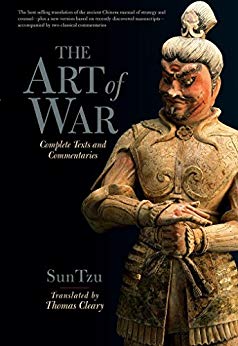

This article is an excerpt from the Shortform summary of "The Art of War" by Sun Tzu. Shortform has the world's best summaries of books you should be reading.
Like this article? Sign up for a free trial here .
In The Art of War, Sun Tzu says, “Every battle is won before it is ever fought.” What does Tzu mean by this? How can you win a battle before you fight it?
We’ll cover how preparation is the key to victory. Learn Tzu’s recommendations for setting the stage for victory.
Every Battle Is Won Before It Is Ever Fought
In order to set the stage for victory, you need to manage both your resources and your forces wisely. Preparation matters: Every battle is won before it is ever fought.
Wise Resource Management
One way a mishandling of resources leads to defeat is through extensive and exhaustive battles. Extensive and lengthy operations deplete your reserves. Thus, an intelligent leader will not keep his troops in the field for lengthy periods.
- Waging war is like igniting a fire. If the flame burns too hot for too long, it will burn itself out.
- Similarly, engaging in extended battles without gain will exhaust your resources, including weapons, money, energy, and food. This will weaken your troops and lead to loss.
Therefore, battles should be swift. Be big and bold, attacking quickly and ferociously, then retreating.
Tactics for Ensuring Ample Resources
Use your enemy’s resources when possible to sustain your troops. Build your armor from your home stores, but when you win the battle, nourish your bodies with the enemy’s food. Feeding off the enemy’s food supply has three benefits:
- You save your resources for when they are really needed, such as during a lengthy campaign.
- You reduce the resources of the enemy, leaving them vulnerable to an attack.
- You don’t have to take food from your homeland, which leaves nothing left for the people and leads to poverty.
Also, take into account that costs of goods near a place of battle will inflate, which causes a strain on the locals’ finances. This scenario can leave a country impoverished as goods are depleted and spending increases.
- For example, if the battleground is close to home, local proprietors of goods will raise their prices to benefit from the military presence.
- As food prices increase, many locals will be unable to afford those goods or overextend their finances to afford them.
- Further impacting locals, the supply of goods will be used up quickly by the military. When there is no more food, the locals will suffer.
- They will have no money available for the procurement of goods from other sources.
- Without food and money, the quality of life for the locals will decrease.
Lengthy campaigns create a negative situation for the homeland, whether the battleground is nearby or far away.
- When resources are depleted through lengthy battles, the people, as well as the military, become exhausted and suffer.
- If your country is left in peril without resources or money, there will be no one to support your leadership anymore.
- If the military acts intelligently, everyone involved, including those at home, will benefit.
Taking all of these factors into account, you will prove that every battle is won before it is ever fought.
Managing Your Force
You should gather your troops only after an assessment of yourself and your enemy has been made and victory is determined the likely outcome. Remember, every battle is won before it is ever fought. If you gather troops too soon and have to redo the action down the line when you really need them, the public will be weary and less supportive.
However, gathering the troops is not all that is required to build a strong and successful force. Ensuring that the troops are rewarded for their efforts will breed motivation.
- Rewards should be intentional and earned.
- They should be delivered without bias of rank.
Rewards given smartly will encourage the troops to behave in a manner that reaps rewards. On the other hand, rewarding everyone equally or arbitrarily will generate no motivation and deplete your resources.
Likewise, punishments are just as useful as rewards in building the constitution of your force.
Historical Example: Rewards
General Cao Cao was a well-respected and renowned military leader in Chinese history who avidly abided by Sun Tzu’s Art of War. Toward the end of the Han dynasty (206 B.C.E. to 220 C.E.), Cao Cao often invaded enemy territories. During these raids, he would acquire a trove of valuable treasures, whether rare objects or gold. Whenever these spoils were retrieved, he would divvy them out to those who showed incredible strength and effort. He was generous with his rewards. Those who did not show exceptional prowess or effort received nothing. In this way, his soldiers were motivated to work hard, and he was able to be successful in most of his battles.
Historical Example: Punishments
General Yang Su commanded during the Sui Dynasty (558 to 617 C.E.). He was known for his decisive leadership and swift executions of those who disobeyed his command. In preparation for battle, Yang would seek out troublemakers or those who’d erred for execution. This number could be as low as 12 men or as high as 100.
When it was time to engage in combat, he would send out hundreds of men to attack the enemy. If they failed, he would execute them and send another group. If they failed, the process was repeated. Everyone under his command understood the stakes of failure, and as a result, they always fought hard and were often successful in overtaking their opponents.
A Thoughtful Plan of Attack
Victory is not just winning the battle. Killing is not the most important thing. Destabilizing your opponent is. If the battle is won but the opponent’s forces and country are obliterated, that is a lesser victory than if you are able to overcome them and force a surrender.
- If you can weaken your opponent’s resolve and force them to concede with their nation intact, your victory is more successful.
- The people will have greater respect for a battle won with integrity than one won through total destruction.
If you prepare your forces and show your prowess in the five traits, you will have won the psychological battle and may avoid a physical one. If the surrender comes before a battle is fought, all the better. Killing should only be a matter of necessity to survive, not the goal of the mission.
Strike Preemptively to Avoid Battle
Striking preemptively is the best way to win before the battle is ever fought. The best time to strike an enemy is when they are involved in preparations. Strike before the enemy is fully mobilized, and they will be unable to fight back. This may prevent a battle. This strategy involves using intelligence, rather than brawn, to win.
If intelligent strategies don’t work, the next strategy is to win through intimidation.
- Form alliances to increase your strength to a point where fighting would be ill-advised for your opponent.
- Form alliances with the enemy’s allies to disrupt the enemy’s power.
Ultimate victory is when battle has been thwarted through intelligence or intimidation, there has been no destruction, no cities have been seized, and no blood has been shed. Every battle is won before it is ever fought, especially those that avoid battle.
Historical Example: Every Battle Is Won Before It Is Ever Fought
During the Spring and Autumn Era (722 to 481 B.C.E.), when the Zhou dynasty was beginning to collapse, the state of Jin wanted to overtake the state of Qi, a much smaller state. The Jin sent an emissary to scope out the Qi. The emissary, feigning drunk aggression, insulted the Qi’s ruler and tried to force the Qi to disregard etiquette. When the Qi did not react to the insult and did not abide the aggressive demand, the emissary returned home and told the Jin leadership that the Qi were alert, cautious, and prepared. Therefore, they should not be attacked at this time. The Qi were able to thwart armed battle through intelligence.
Prepare Adequately
However, if strategic, psychological warfare does not lead to an early solution, then you may be called upon to physically attack enemy forces. Attacks should be on enemy forces only, not territories, cities, or civilians.
Prepare ahead of time to avoid catastrophe in the field. Sun Tzu says six months are required to prepare the materials for an attack, including weapons and shelters, to avoid malfunctions and casualties. Don’t rush into battle without first ensuring that you’re adequately prepared. If you fight from a place of anger and don’t take time to prepare, you will be sending your troops to their deaths. Preparing is key: Every battle is won before it is ever fought.
A strategic siege is one where your forces are still strong, your resources still ample, and your casualties are nil.
The Rules for Approaching Enemy Forces
If all traits are equal between you and your enemy, there are rules for how to proceed.
If you have ten times the troops, you should surround the enemy.
- A large differential is needed if you are to enclose them without gaps in the formation.
If your numbers are not large enough to attack, such as only five times larger than those of the enemy, divide your troops into groups.
- Use several groups to broach an attack, and keep a few back to bar against surprise attacks and exploit any enemy weaknesses you observe as the attack progresses.
If you are only slightly larger, such as a two-to-one ratio, divide your troops into two groups.
- Use one group to draw out the opponent, and use the other to attack them unexpectedly.
If you are equal in size and ability, deploy strategies to avoid direct combat.
- Use strategies of division to disrupt the enemy’s power, then engage in ambushes and surprise attacks.
- If this strategy is not possible, go on the defensive and stand your ground.
- Don’t get pulled into battle if you are not sure of victory.
If you are smaller or weaker, avoid conflict and flee.
- Again, engaging in battle without the assurance of victory is a foolish strategy.
- After retreating, build up your defenses and see to the nourishment of the troops.
- Wait for a gap in the enemy’s strategy or for the enemy to relax, then strike.
Understanding Appropriate Strategy
The strategy of your troops must be malleable based on circumstances. If you try to control the troops only after conflict has begun, you will be thwarted or outmaneuvered. This is one of the reasons that every battle is won before it is ever fought.
If you know your strengths and abilities and measure them as effective against your opponent, you can enter conflict prepared for anything. If you only know your strength and not your opponent’s, you will enter conflict blindly.
- When you understand the essence of your enemy, you will know how to approach battle against them.
- When you understand your essence, you will know where you are vulnerable and how to mitigate impact.
Historical Example: Knowing When to Fight
At the beginning of the new Tang dynasty (618 to 905 C.E.), the founding ruler wanted to wipe out rebel armies from the former Sui dynasty still on the attack. When the ruler and a fellow warrior scouted the rebel army, they saw they were at a disadvantage sizewise. The warrior cautioned that attacking the rebels head on would be impossible. He suggested fortifying their position to tire them out and deplete their resources. The rebels expended much energy to instigate a battle with the Tang and ran out of food by nightfall. When they started to retreat, the Tang army followed and overpowered them.
———End of Preview———

Like what you just read? Read the rest of the world's best summary of "The Art of War" at Shortform . Learn the book's critical concepts in 20 minutes or less .
Here's what you'll find in our full The Art of War summary :
- How to mislead your enemies to win the war
- Classic examples from Chinese history to illustrate Sun Tzu's strategies
- How to use spies to gather information and defeat your opponents






